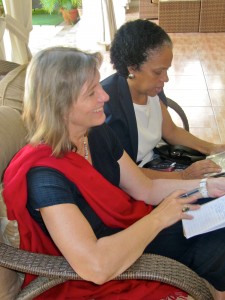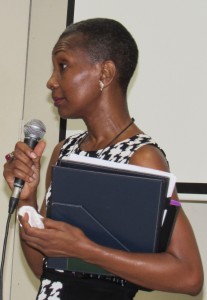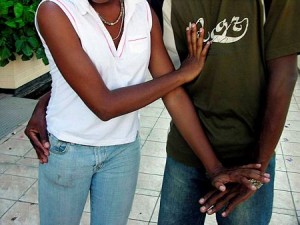
Human Rights Begin At Home
September 27th, 2016
It was a busy evening in Half Way Tree. A huge thunderstorm descended on the area, just as rush hour started. Rain fell in bucketfuls, and traffic slowed and started to pile up outside the Webster Memorial Church Hall. Yet, a group of women fought their way through the puddles, arriving on the doorstep somewhat damp but determined to discuss human rights issues.
The discussion was organized by the 51% Coalition with the support of UN Women, and well moderated by Reverend Marvia Lawes. The Coalition’s project, which has just ended, focused on building a women’s constituency and was firmly grounded in human rights. This conversation during a rainstorm took an interesting turn, when Nikki Sewell Lewis of the Coalition and Women’s Resource and Outreach Centre declared that “human rights awareness starts in the home.” Ms. Sewell Lewis added, with some pride: “I have a feminist husband!”

UN Human Rights Advisor Birgit Gerstenberg (foreground) at a UN meeting in Kingston in 2014. (My photo)
What did she mean by starting in the home? Other women in the audience had touched on it indirectly, talking about their concern for their families, and particularly their children, in situations where human rights are endangered. Sadly, this happens so often within the walls of home, as well as out in the wider community. The women present, mostly from less privileged communities, were aware of the need to be vigilant and to protect themselves and their families, in the face of a daily lack of concern for their rights. As the Kingston-based UN Human Rights Advisor Birgit Gerstenberg noted: “A violent society is an intolerant society.” We must all be aware by now that there is too much violence in the home – and not only in the poorer communities, but across the board. It has an utterly dehumanizing effect. Besides, whom can you trust, if not family members?
This intolerance has almost become the normal way of behaving, the women suggested. One Justice of the Peace (J.P.) in Denham Town told us a very described how disrespectfully she was treated at a local police station. One policeman dismissed her polite request, but hastily changed his tune when she told him she was a J.P. Why should it make any difference, she asked? Respect should be for everyone, not only if you are a “smaddy.”
Human rights are not one of those things you can set aside for a while, and then return to whenever convenient. It should be ever present in our minds and actions. As Birgit Gerstenberg noted, human rights must be a permanent item on the agenda. It is ever-present because “discrimination is a power issue,” and so it affects the way we relate to each other every day. The policeman was exercising his power over a woman standing before him.
We discussed other forms of human rights abuse and discrimination that women encounter in their daily lives. One young attorney at law talked about her experience in the corporate sector, where sexual harassment was a regular occurrence. Now separated from that environment, she is making plans to combat the issue in a positive way. And a member of the Jamaica Household Workers Union described how embarrassed she was by others, who scorned her because “I wash people’s dirty clothes.”
We expect to hear more from our political leaders too. The Sexual Harassment Bill was tabled in Parliament in December, last year. The Jamaican Government talked a lot last year about the establishment of a National Human Rights Institute. Can we see some action, please?
Speaking of discrimination, earlier this year I participated in a Privilege Walk organized by Respect Jamaica (you can find it on their YouTube channel here). It was a powerful and revealing exercise. The making of the video by an excellent local filmmaker demonstrated clearly to those participating (I was among them) – and hopefully to those who subsequently watched it – that we humans have so much more in common than we have differences. We exchanged glances with each other as the video filming progressed, not wishing to leave anyone behind us if we stepped forward. Significantly, though, an LGBT Jamaican (“the T in LGBT,” was the gentle explanation) fell behind, as well as the inner city youth. The rest of us ended up somewhere in the middle.
“We realized… We weren’t that much different,” concluded one of the Jamaicans who participated in the film.
Reverend Marvia Lawes used a very interesting term: Personhood. To me, this word encapsulates our existence as human beings, with rights and responsibilities. “We need to be friends,” added Rev. Lawes, simply.
Compassion is the key to unlocking human rights, tolerance and solidarity. As another religious figure, the Dalai Lama said:
I believe that at every level of society – familial, tribal, national and international – the key to a happier and more successful world is the growth of compassion.
Tags: 51% Coalition, Birgit Gerstenberg, Dalai Lama, gender equity, gender-based violence, human rights, Jamaica Household Workers Union, Justice of the Peace, Kingston, LGBT community, Marvia Lawes, National Human Rights Institute, NGO, Nikeisha Sewell Lewis, Privilege Walk, Respect Jamaica, sexual harassment, Sexual Harassment Bill, UN Women, United Nations Human Rights Advisor, videography, Women's Resource and Outreach Centre, YouTube
The Gleaner reserves the right not to publish comments that may be deemed libelous, derogatory or indecent.
To respond to The Gleaner please use the feedback form.
2 Responses to “Human Rights Begin At Home”
- We Are the Zoomers
- Living Online with Humans and Birds: NAOC 2020
- Human Trafficking and the Problem of Public Education
- Down Memory Lane
- Are We Ready to Recover from COVID-19?
- Road Safety Matters: Is Your Vehicle Safe?
- Sexual Harassment, Me Too, and the Minister’s Disturbing Giggle
- The Vulnerable Senior Citizens, Private Care Homes and COVID-19
- A Muddle Over Masks
- Here is Something Life-Saving You Can Do: Give Blood!






This is a great article Emma. Keep up the good work. This conversation should be the first of such across the country. One cannot underscore the rampant abuse of human rights that occur in our homes, at our schools, our places of worship and our workplaces. As a society we need to have these discussion s to start the change needed to transform our nation into the place where people want to live, work and raise families…
Thanks so much, Nikki. I absolutely agree with you – this conversation needs to happen in every corner of our island! It is such a huge and wide-ranging problem that is affecting every woman (and man and child, too). Just looking at the expressions on the faces of audience members, I could see the stress and strain of it. Thanks for all the great work YOU do, Nikki!